Development
Vivienne Yeda Apopo, Lady Who Nearly Became Central Bank Of Kenya Governor Could Be Collapsing East African Development Bank
Published
9 years agoon
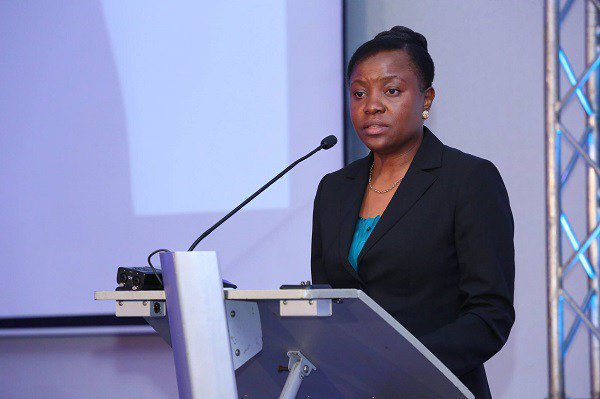
A good number of people do not know Vivienne Apopo but amongst the banking fraternity, she’s one of the most powerful figures of the industry in the region. Vivienne Yeda Apopo is a Kenyan banker and business attorney. She is the current Director General of East African Development Bank(EADB). She assumed that position on 15 January 2009. She also currently serves as a member of the Board of Directors of the Central Bank of Kenya, since 14 March 2011.
The East African Development Bank (EADB) is a development finance institution with the objective of promoting development in the member countries of the East African Community. Governments of Kenya, Rwanda, Tanzania and Uganda both have stakes in the Bank. Coincidentally, African Development Bank and Commercial Bank of Africa which is affiliated to President Uhuru also have stakes in the Estimated USD381M assets valued bank.
Vivienne was posed by a section of ruling elite to succeed Njunguna Ndung’u as the Central Bank Of Kenya Governor since they viewed her as a compliant to innuendos that they might pursue. Her bid however didn’t materialize. However, from information within Kenya Insights hold, Apopo’s efforts did materialize elsewhere, creating a corruption and impunity den at EADB.
The lady boss who is a darling to the President given that he holds stakes in EADB, boasts of being untouchable making her run the institution as she wishes knowing no repercussion would befall her in line.
Distressed staff members wrote a petition to the Board of Governors of EADB detailing gross misconduct but Kenya Insights is informed by insiders that she used her influence to silence and water down the petition forcing the staff to seek other alternatives including writing a letter directly to the President who happens to be a double shareholder as GoK and CBA.
The petition from EADB staff members below, details the gritty details of how Apopo is slowly but steadily running down one of the highly valued Banks in the region something that should worry all stakeholders, majorly the individual governments.
We, a group of staff at EADB write to express our concern over the manner in which the Bank is being run under the leadership of Ms. Vivienne Yeda Apopo. We bring to the attention of the concerned parties requesting that her services as Director General at EADB should be terminated immediately for several reasons some of which we will explain below; Despite the fact that the Bank went through a restructuring process in 2011, the loan book is not growing.
The DG is hesitant to grow the business. Much as she might have been good at cleaning up the book and recovering the written off loan (which account for a bigger percentage of the profit the bank has been reporting) she does not have the will and capacity to grow the loan book. The business teams within the Bank have brought in several viable projects in the pipeline but she never wants to approve them or recommend them to the board. Some of these projects have very high social and economic development impacts and are financially viable but she has declined most of them.
The Bank is currently highly capitalized with regular share capital contributions from the member states. The bank has also been able to attract several lines of credits from the likes of African Development Bank, the European Investment Bank, BADEA, OPEC, etc. However out of the Bank total assets of USD 381 million, only USD 165 million has been utilized to lend to projects. The Balance of USD 216 million has been placed as short term deposits in commercial banks.
To confirm that the current DG does not have the interest or capacity to grow this strategic Bank for the region, if you check through the records at the Bank, you will find that over the last 3 years, projects valued at over USD 200 million, (most of which are viable) have been declined and removed from the Bank pipeline at her instructions. Countries like Rwanda and Tanzania have financed less than 5 projects each in the last five years. Yet these countries have a pipeline that she declines, even when the country units and the projects committee of the Bank have recommended them for financing. Uganda and Kenya have equally suffered the same. Countries like Rwanda and Tanzania also subscribe to share capital from tax payers money and yet they are not fully benefiting from the Bank. Her lack of interest to grow the Bank has become worse in that since we started this year of
2016, only two projects in the entire Bank have been presented to the board for approval and we still don’t have projects that she has cleared for detailed appraisal as candidate for the next board approval. We are likely to see no business at all this year much as the Bank still receives viable projects that require funding and at the same time the Bank is well capitalized. The two projects which were approved early this year are far away from being disbursed due to a very slow legal documentation process caused by the reasons we shall highlight below.
Because the Bank is not lending and yet it is well capitalized (some of the lines of credits are used to reimburse some of the projects which have already been funded/disbursed which is fraudulent) the Bank profits have started dropping as evidenced in 2015, which situation is likely to continue because the high profits recorded in the previous years were mainly from recoveries of loans previously written off. These written off projects have fully paid up and at the same time the book is not growing because we are not lending. Coupled with some bad projects which she has single handedly pushed to the board even when the rest of the teams in the Bank have recommended not to proceed (Like Dari Ltd in Kenya) the bank will soon find its self in the situation it was in about 8 years ago with no business, high NPL’s and with some court cases which might take the direction of blue line case.
Much as she declines a number of projects, she still accepts some projects in which she is deemed to have personal interest because some of them are at times not viable like the DARI we have just mentioned above. The Bank needs a new DG who will put systems and structures in place, empower and respect the structures to deliver. Otherwise the Bank is not visible at all in the region and we risk becoming irrelevant very soon.
Out of all the projects approved by board in the last three years, projects worth over USD 150 million have never been disbursed and will never be disbursed. A few of these projects were declined or halted by the clients but over 80% of these projects were stopped by the DG. The clients got so frustrated and end up going to look for funding somewhere else. She does not want to grow the book and she ends up frustrating good projects. The Bank’s name in the market has been tainted partly because of this practice.
In the first place, she brings such projects to the board to show the board that she is working hard, but at the back of her mind, she is simply manipulating the board members to approve her other requests which have nothing to do with business. She did a lot of that to get the board to approve the several budgets for renovations of the office and residential bank houses, on top of using it as a lobby tool for the board to give her the current contract. We wonder why the board does not ask despite approving many projects, the book is not growing. Please note that all projects we bring to the board will have paid 1%
of the loan amount as appraisal fees. We are supposed to refund 75% of that 1% if we don’t disburse the project. However the appraisal fees refund process has been applied selectively. Clients known to her normally receive their refunds and those not known to her or the small ones never get their refunds. An example is, she refunded appraisal fees for the Rai Holdings group (a multimillion dollar company) but refused to refund for a small farmers organization called Igara Tea Growers. Over USD 500,000 remains un refunded to date much as these funds were part of the profits declared by Bank. Some of the clients have threatened to take the Bank to court if these monies are not refunded.
The Bank is currently experiencing serious governance issues with the current DG making all decisions by herself at all levels. She approves all payments even for buying coffee, she approved any project into the pipeline, she approves all term sheets, she approves all appraisal reports, etc. in other words the Bank is one a person show and if she is away, every thing comes to a stand still. Since she travels a lot and even when she has left any one in charge, that person can never approve or make any decision on anything without her express instructions (even if she is in Europe) which stalls so many activities at the Bank.
The Bank is supposed to have a staff structure comprised of the DG and other Directors/Head of Departments, among others. The Directors/Heads of departments would be running the day to day affairs of the Bank and leave her as the DG to make strategic decisions for the Bank. However the opposite is true. She manages each and every aspect of the Bank’s day to day operations which stifle activities and decision making at the Bank. For very many years now she has refused to fill most gaps in the organization structure which leaves her to run the bank as an individual would run a house hold. She has told some people that the EAC region does not have qualified people that can be recruited to run the Bank in those positions and yet other institutions have been able to recruit people from within the region.
Remember the Bank recruits very highly qualified and skilled staff who once they get into the bank, she makes them idle. She is scared of being challenged and the reason she makes all decisions by her self. This means that all existing structures and activities of the Bank must wait for her approval before anything moves, however small the decision to make might be. We invite the board members to come and interact with staff members in the absence of the DG, they will be shocked at what mess the DG has put this Bank into. In all her life as DG at EADB, she has never held a single management meeting with the senior managers in the Bank and not even with the country managers responsible for the different countries. She has never addressed staff, she never
participates in staff end of year parties, and therefore no body in the Bank knows her vision and strategy for the Bank. Which leaves every one guessing which direction the Bank will take apart from herself? Since she solely determines which projects the Bank should fund, the basis of which is some times is not project viability, rather personal interest and whether she knows the project owners personally or not.
For sure the Bank can not do business in that way. The Bank is currently managing a line of credit from KfW of Euros 8 million with a Euros 1 million for Technical assistance. The financial institutions who benefited from this line of credit include; Dfcu bank (Euro 5 million), Ecobank Uganda (Euros 1.5 million) and Finance Trust bank (Euro 1.5 million). The selection of Dfcu bank and Ecobank were influenced by the DG personally. The fund is meant for rural enterprises but Ecobank has only 4 branches out of Kampala and may not effectively utilize the funds.
Funds were disbursed to Dfcu in July 2015 but todate they have on lent less than 10% of the funds. Ecobank has held the funds for close 6 months now and they have not lent even a single coin. The staff had preferred the smaller banks like Finance Trust bank who have to date lent out over 90% of the funds we disbursed. The smaller banks whose main mandate is to lend in rural areas are more effective for this kind of fund as longer as they are regulated by the central bank. The DG insists on putting in place tough conditions which weed out the smaller banks in the process. The IPC consultants hire by KfW are currently in the bank and can confirm this information. This is an example to show bad leadership and how the DG wants to manage each and every process and decision in the bank. Of course we would propose that KfW puts a halt to the ongoing process for the new agribusiness line of credit until the board has sorted out leadership issues at the Bank otherwise the funds may not meet the objective for which it is meant to achieve.
The permanent secretary Ministry of Finance sits on the board of the Bank and therefore KfW could make sure the board acts through the Ministry of finance. The Bank had a strategy 2010 to 2015, but this strategy changed several times depending on who she was presenting it to. Staff members were not allowed access to the strategy and as a result, if you randomly talked to most staff especially managers and below, they don’t know which direction the Bank is heading. We proposed several times to her that the Bank should hold meetings with all staff to cascade the strategy down wards but she refused all that. Right now the Bank is supposed to be developing a strategy for 2016 to 2020, however she hired a consultant from the UK who is paid very expensively to develop a strategy alone. This activity has not involved other staff and therefore the draft strategy is only
known to her and the consultant. We believe she is preparing the strategy document to simply meet the requirements of the board members and other external parties. However like many other documents prepared by consultants it will never be cascaded widely within the Bank. This can also be confirmed by the IPC consultants who were hired as part of the KfW line of credit technical assistance. So most likely business will continue as usual. She sets targets for countries arbitrarily without putting in place resources to help counties achieve these targets.
The DG does not even hold the quarterly and annual appraisal meetings with the managers who report directly to her. She has delegated this role to a HR consultancy firm (adept systems/Sally Mukwana based in Nairobi) which firm does not appreciate the day today challenges the staff go through in order to do their jobs. Even when the consultant is told of the challenges the staff go through dealing with a DG who can not communicate properly with staff, despises every one, they can’t change how she operates because they still want to be hired for the job.
The HR consultant resorts to intimidating staff and sometimes recommending some of them for firing or not renewing their contracts simply based on imagination. The internal HR unit has been reduced to clerks and can never advise the DG and she takes in their advice. The staff members are de-motivated and frustrated which ends up in many staff members simply resigning and moving on. If some one cares to cross check this information, get to the Bank records and you will be surprised at how many staff have resigned in the last 4 years for such a small organization. This destabilizes the Bank since staff members that are critical to the Bank and have gained understanding of how the bank operates, normally leave the Bank.
The Bank needs stability and growth. But this can not and will never be achieved under the current leadership of our DG. Adept systems consultancy firm (Sally Mukwana) has continuously been retained by the Bank for over four years now, initially to support the recruitment process but after failing to recruit staff. They have ended up duplicating roles of the HR department on an ongoing basis and yet the HR manager and her staff are left idle. The consultancy firm has cost the Bank close to USD 500,000 over time doing assignments which should have been implemented by the HR department if we had a DG who respects her staff.
Much as the Bank might have required short term HR consultancies, they should never have taken on lots of the roles played by the HR unit on a long term basis. The HR consultants have even on several occasions gone to present to the board, when it should have been the HR manager doing this. As a result these permanent consultants cost the Bank a lot of money in air tickets, 5 star hotel accommodation for long periods and consultancy fees. This is a waste of tax payer’s money and gross abuse of office by the DG who hires them.
Because she can not manage people and she never wants to implement recommendations from a professional HR manager, she retains these HR consultants to manage and intimidate staff on her behalf.
known to her and the consultant. We believe she is preparing the strategy document to simply meet the requirements of the board members and other external parties. However like many other documents prepared by consultants it will never be cascaded widely within the Bank. This can also be confirmed by the IPC consultants who were hired as part of the KfW line of credit technical assistance. So most likely business will continue as usual.
She sets targets for countries arbitrarily without putting in place resources to help counties achieve these targets. The DG does not even hold the quarterly and annual appraisal meetings with the managers who report directly to her. She has delegated this role to a HR consultancy firm (adept systems/Sally Mukwana based in Nairobi) which firm does not appreciate the day today challenges the staff go through in order to do their jobs. Even when the consultant is told of the challenges the staff go through dealing with a DG who can not communicate properly with staff, despises every one, they can’t change how she operates because they still want to be hired for the job.
The HR consultant resorts to intimidating staff and sometimes recommending some of them for firing or not renewing their contracts simply based on imagination. The internal HR unit has been reduced to clerks and can never advise the DG and she takes in their advice. The staff members are de-motivated and frustrated which ends up in many staff members simply resigning and moving on. If some one cares to cross check this information, get to the Bank records and you will be surprised at how many staff have resigned in the last 4 years for such a small organization.
This destabilizes the Bank since staff members that are critical to the Bank and have gained understanding of how the bank operates, normally leave the Bank. The Bank needs stability and growth. But this can not and will never be achieved under the current leadership of our DG. Adept systems consultancy firm (Sally Mukwana) has continuously been retained by the Bank for over four years now, initially to support the recruitment process but after failing to recruit staff. They have ended up duplicating roles of the HR department on an ongoing basis and yet the HR manager and her staff are left idle. The consultancy firm has cost the Bank close to USD 500,000 over time doing assignments which should have been implemented by the HR department if we had a DG who respects her staff.
Much as the Bank might have required short term HR consultancies, they should never have taken on lots of the roles played by the HR unit on a long term basis. The HR consultants have even on several occasions gone to present to the board, when it should have been the HR manager doing this. As a result these permanent consultants cost the Bank a lot of money in air tickets, 5 star hotel accommodation for long periods and consultancy fees. This is a waste of tax payer’s money and gross abuse of office by the DG who hires them. Because she can not manage people and she never wants to implement recommendations from a professional HR manager, she retains these HR consultants to manage and intimidate staff on her behalf.
Of great concern is how she has handled the legal department in the Bank. The current DG was in the past years at the Bank as head of legal. Which roles she still duplicates up to today even when she is the DG. The legal department is very critical to the operations of the Bank but it has been crippled because of her. About 3 years ago, the bank had a stable and well experienced team of 4 lawyers from within the region (one from each country), who she frustrated and they all left the Bank.
These lawyers are still within the region working in various institutions they went holding very senior positions. So someone can talk to them to collaborate our story. After they resigned, she hired 4 other lawyers; 3 from Europe, 1 from USA and 1 from Kenya. These lawyers struggled to understand the local lawyers. Coupled with her frustrating them and not allowing them to question any thing, they all resigned in a space one year. The very expensive lawyers from Europe and USA were not necessary, since at that time we dint have many international transactions we were handling and if we had such, it would have made a lot of sense to use external local firms who are affiliated to some international firms. These lawyers disagreed with her mode of operation and all the three resigned.
This is after the Bank had spent a lot of money on them. At the same time, the DG single handedly sourced another law firm in the UK called Evershed who she has also used on several assignments over a period of time. So in procuring both the HR consultants and now the London law firm, not proper procurement guidelines were followed. The Bank does not have a lot of business at the moment to warrant the use of such law firms which charge the Bank an hourly fee of USD 520. The lawyers from this firm are sometimes flow into the country and spend at least a month in Kampala. They have to be accommodated in apartments which cost USD 3,000 per month.
The kind of assignments these international lawyers are paid a lot of money to do can surely be done by our lawyers within the region without wasting tax payer’s money. Simple assignment like reviewing tenancy agreements, reviewing term sheets drafting facility agreements for simple transactions should not be given to the London law firm which over time has cost the Bank close to USD 1 million.
We believe that because of her arrogance, she despises lawyers from within the EAC region. We don’t need such a person to continue heading a regional institution. She can argue that the use ot the London law firm is to avoid court cases like the blue line which almost took the Bank down. But remember blue line case was created by her when she was still the Head of legal at the Bank. Because she is extremely rude and arrogant to clients and staff (much as she puts on a different face to the outsider), this ends up getting the bank is legal battles especially with the clients which could have been avoided. Currently there are some loaming court cases which could easily end up like blue line if she continues as the DG at the Bank. Eden international took the Bank to court because of her arrogancy. She refused to meet and discuss amicably with the owner of the project who is also a Judge of the high court in Uganda.
This very simple case could end up badly. Another project (DARI Ltd owned by Hon Raphael Tuju) in Kenya has been mishandled by herself and there are many chances that it will end up in court for a loan of USD 9.197 million. Every body in the Bank advised against this project but she directed that the project should be taken to the board, it was approved and disbursed. However as we speak, it has already gone bad. An internal legal team recruited from the region supported by a panel of regional law firms from each country can sufficiently support the Bank without the need for London or USA based lawyers.
Currently the Bank has another lawyer on full time basis who was hired from London. He has been made idle and yet the Bank continues to pay him a heavy salary and an expatriate allowance. Even if the bank was to use international law firms, this should be on a very short term basis and on a particular transaction and such costs could be shared with the clients.
The manner in which the legal department has been handled is pure abuse of office and power. During the previous board meeting held in March this year, DARI Ltd and Benver Estates both projects from Kenya were supposed to have been on the NPL list. Because she did not want the Board members to ask many questions about DARI since it was only disbursed recently and not even fully. And by including DARI as an NPL, this would have raised the NPL ration above 5% which she did not want. She instead forced and intimidated one of the staff to lie to the board by including another project called Lake Heights in the portfolio report as an NPL when this project was not an NPL since it had been paying its loans normally for the last 7 monthly installment cycles.
Because of this, the staff who was forced to lie to the board by the DG, resigned immediately he returned from the board meeting in protest of this action, among other reasons all related to how he was belittled by the DG in front of the board members. This information can be confirmed by looking at the Bank records and the portfolio report which was presented to the board and the email exchanges between this particular staff and DG, where she pushed for these changes. We believe this is not the first time she is telling lies to the board members.
The Bank excessively uses consultants who are given short term contracts (3 to 6 months) which are always reviewed for up to 3 years and some beyond. These consultants cost the Bank a lot of money and yet they don’t help to build the institution. DG’s strategy is not to build a sustainable team at the Bank but to use short term and very expensive resources to achieve her person targets. Am sure she does not care what happens to the Bank after she leaves. She has painted a rosy picture to the outsiders and yet the Bank is rotten internally. Things could drastically change if a new DG is appointed for the Bank. For a small Bank of about 65 staff members, we have over 10 permanent consultants. Some of these consultants even sign documents and approval payments on behalf of the Bank which is very dangerous.
The Bank has received some grants from some institutions like AfDB and DEG (both shareholders) to build capacity of the Bank. What she has done is to hire very expensive consultants from Europe who come and work on their own and not allowed to interact with any staff members apart from her self.
These consultants have developed products, policies, manuals, risk management systems, however all these are idle. They can not apply because the day to day users were not involved or the consultants did not interact with the staff to ensure what they develop can be used in this environment.
I can say these grants have gone to waste. And yet they are meant to build the capacity of the bank and staff for sustainability. An independent audit needs to be carried out at the Bank but can only be successful when the DG has been interdicted. She threatens staff members not to renew their contracts and in the end staff keep quiet in order not to loose their jobs. However if every one knew that she is out, you can get the truth about the appalling state of the affairs at the Bank. The DG single handedly participates in all international and regional events, workshops, conferences and meeting where the Bank is usually invited. No staff member is ever involved in such travels and events. Even her country managers have not been exposed to international foras including those where a third party is willing to meet the costs. Under normal practice the DG would sometimes travel with her senior managers for exposure and training purposes but this does no happen here.
If an analysis was carried out on the Bank’s travel budget, you would be surprised that 99% of the travel budget for the bank is consumed by the DG alone. Because she never prepares any reports for such travels and neither does she brief any one on her return, the Bank can not effectively benefit from all the money it spends in such travels. Because she travels a lot and she still wants to control the Bank even while away, the Bank always comes to a stand still whenever she travels. We have lost creditability in the market because we delay to close transactions and can not give quick responses because we always have to rely on her availability to approve any responses.
You will realize that over 50% of approvals are made on mail, because she is rarely around. For example she has not stepped at the head office the entire month of May. Payments to service providers and suppliers have been pending. No project work is moving and everything at the Bank has come to a stand still because she is away. We believe that she could either delegate real authority while she is away so that work can continue but this can not happen. Or else she could delegate her senior staff or country managers to represent her at some of these foras but she never does so. Her expensive trips alongside the high budget for her office and her home cost the Bank a lot of money.
Imagine an institution where the DG earns USD 35,000 per month on top of all her personal expenses being catered for by the Bank including at home, with two SUV vehicles at her full time disposal, while the rest of the majority of staff earn below USD 5,000 apart from consultants. She also frequently cancels air ticks in business class which costs the Bank a lot of money. We believe this is abuse and it should be stopped. All these facts can be confirmed. The DG has on several occations picked perdiems from the Bank that she is going to work from the Nairobi office but she never appears at the Bank’s office in Nairobi at all. Since Kenya is her home country, we imagine she spends this bank time and money on her private errands.
On several occasions, the DG has used the Bank cars to go for her private trips in her home village in western Kenya. The use of the Bank vehicle for her personal trips in her home village has happened several times and can be confirmed from records at the Busia board between Kenya and Uganda. The latest occurrence being during the recent Uganda election period where she spent quite alot of time in her village with the office car. This is total abuse of Bank money and assets. The DG spends a lot of time travelling in the name of looking for partners and lines of credits and yet we can’t lend out the funds we have currently from various lenders. We propose the bank cuts down on the many partnerships being negotiated and instead concentrate on the lending business since this is our core business.
Once we have stabilized and grown the book, then we can get into partnerships and look for more lines of credits. Otherwise we are spoiling our name as a bank because the lender and partners we have are starting to realize that what they were told at the time of getting into partnerships was not true. Once we lose them, word will go around and we shall end up failing to get more in feature.
For example, we have hard KfW and AfDB complain about certain things they were told would be put in place and up to now she has not allowed them to be in place. The Bank has a projects committee and country office projects committees. However most decisions from these committees are not respected by her. If she does not like the project or the owner, even if every one else has recommended the project, it will never be funded. And yet in normal institutions, the DG should not be involved in such technical work and decisions.
If she has an interest in a project (Like Dari) however bad it is, she will intimidate every one until the project has been funded. Whoever tried to oppose her, usually have their contracts not renewed. Recently African Development bank had a supervision mission at EADB. This mission talked to some staff and discovered most of the abuse of office and governance weaknesses we have revealed in this petition.
The mission was conducted by Ms. Juliet Byaruhanga (Senior Private Sector Officer based in Kampala) and Mr. Dennis Ansah (Chief Portfolio Manager Officer based in Nigeria). The board should feel free to read their report or directly talk to them. They will confirm much of what is contained in this petition. She does not respect other institutions and their heads both within the region and out side the region. Most CEO’s in the market have complained that she does not give them due respect. Examples include; she never attends most of the EAC secretariat meetings even when invited by the secretary general.
In 2015, FMO indicated to the Bank that they wanted to sell off their shares and exit the Bank. FMO senior officers who were working on the exit plan made several attempts to meet the DG but in vain. They are not happy with the Bank. Some heads of units from KfW head office in German tried to make appointments to meet with her last year but they failed. They are not very happy with the Bank. The Bank is currently hosting the UNFCCC – Regional collaborating centre for East South and central Africa at the Bank Head office in Kampala.
However the DG has refused to meet the UNFCCC bosses who come to the RCC in our Kampala office on several occasions. The UNFCCC team has hosted several high profile seminars and workshops where she is invited to officiate but she never attends. They have invited her to attend some meetings at their head offices or send staff which she never responds to. They don’t respect the bank and they are not happy. Locally in Uganda where the Bank HQ is located, she has ignored severely high level events.
We appreciate that she can not be every where at all times or attend every event, but some are normally very critical for the Bank and she cant even delegate. As a result, we are loosing value in the market and lately, the Bank is not invited to some key events, where a Bank like EADB would add value being a regional bank. The Bank has started loosing visibility, credibility and relevancy both within the financial services market because we are not financing serious projects but also in the eyes of the key stakeholders because of the way the DG behaves. If you talked to some CEO’s of some commercial banks, they will tell you that she is very disrespectful.
At the moment, there are two large syndicates being arranged in the Ugandan market but the lead arrangers for these syndicates and the participating banks don’t want EADB to participate because of how EADB has handled documentation for syndicates in the past, causing lots of delays to concluding these transactions, since the DG wants to manage every step of the process. The Bank’s image in the market has diminished.
Because of the several resignations, some country offices which generate business for the Bank have been left grossly understaffed for some time and yet she does not seem to be interested in filling up some of these positions. For example, Country office Rwanda has one project officer and the country manager, Tanzania has one project officer and the country manager and Uganda also has one project officer and the country manager. We believe there are enough skills within the region to fill these positions. Much as she tells HR that we cant find the right people in the region. She has on several occasions tried to negotiate with staff from the UK but we strongly believe that the Bank does not need staff from the UK or USA.
The region has enough skills which can fill the positions and deliver for the Bank if well motivated, trained and exposed alongside good leadership. Regarding the bank strategy and her ability to get the outside world to think the Bank has greatly inproved, she has kept various versions of the previous strategy and the organization structure. Depending on who she is presenting to, she has always used different versions of the strategy and organization structure. She has told lies at different foras that certain positions within the organization structure are filled, when she is referring to consultants who go away after some time.
The current strategy has been prepared by a consultant from Maxwell stamp London who are very expensive, they don’t have an appreciation of the local operating environment and we believe the draft strategy in place currently will keep in the shelf like the previous strategies. The consultant has worked by himself and the users have no idea what has been prepared, what has informed the strategies, etc. a proper DG would have involved all key staff in the strategy formulation and review process. Of course she has manipulated the outside world including Lenders, the board, rating agencies only because the Bank cleaned the book and was making some profits. But these might not be the case any longer.
Because she has told many lies to the board and other partners, she never wants staff to freely interact with the board and other partners. The same reason she might not want to travel with staff to some international events for fear that staff could easily spill the beans. Staff members have tended to keep quiet in fear of loosing their jobs since the DG has been given excessive powers to determine staff members destiny.
All staff are given two years contract while some after being renewed are given one year. Two years are two few for a staff working in a development bank. A project cycle from admitting a project into the pipeline to approval, to full disbursement and implementation takes about 5 to 10 years. Staff should be given at least a 5years contract to be available during the life of the projects they work on. However the DG reduced the contract tenor as a tool for her to intimidate staff.
Staffs live and work under fear, praying that after two years their contracts should be renewed. At the Bank contract renewal does not depend on performance per say but on what the DG feels about the particular staff. HR does not have any say in contract renewal. Some staff who she is not in good books with normally have their contracts expire and they work for even months before she renews their contracts. If she wants a staff to leave the Bank, she gives short contracts for 2 weeks to 3 months simply to frustrate the staff until they resign.
The 2 years contract affects staff productivity because after one year, most staff spend time looking for other jobs just in case their contract is not renewed. Remember staffs have families to look after and this uncertainty is normally inhuman. On the other hand, most staff normally depend on staff loans from banks for personal development. Coupled with the fact that the Bank does not give staff loans, no commercial banks out there will give staff loans for 2 years, and even when they do, and such a loan can not help any staff to develop.
These are some of the things that motivate staff to work hard. The bank has serious procurement flaws which need urgent attention. The Bank seems to be loosing a lot of money through the single sourcing approach by the DG. We strongly believe costs have been inflated due to lack of proper procedures. The Bank at some point had hired a professional procurement specialist to support guide the Bank to follow procurement guidelines, but he shortly resigned when the DG tried to arm-twist him to circumvent procedures.
We saw a lot of poor quality work and materials used during the Head office building renovations and yet a lot of money was spent. In some areas of the building, certain fittings are already falling apart. We believe there will be serious issues between the Bank and the contractor when finally handing over the building because of quality issues. A serious procurement audit needs to be carried out. In some cases we observe more items were procured that would normally be required for an institution like EADB which uses tax payers money.
A simple example is a well furnished board room with state of art equipment, which is never used. The Bank continues to spend a lot of money holding board meetings in hotels even when the meeting has taken place in Uganda. The building has two restaurants with state of art fitted kitchens, both of which are never used at all and yet staff have to go out of the building to look for lunch even on rainy days. We believe over procurement and single sourcing approach was used as a means to squander bank money.
To give you an example of how staff are mistreated, all staff including senior managers and the Uganda country manager park their cars on the street or at the Imperial Royale parking lot (about half a kilometer from the Bank) whereby staff have to walk to office after parking their cars whether its raining or not. The office parking space is 75% empty and only used by the DG infront of the building at some tenants at the back of the building.
Seriously the Bank’s core business is financing projects and not letting out buildings. Therefore tenants should not be give priority for parking space over staff members who dedicate their time to work for the Bank. I know because the DG does not want to grow the book through lending, and yet she still wants to report some profit, she is sacrificing staff for tenants because she needs that other income from letting out Bank property to supplement the bank profits. This is not the Bank’s core business and therefore staff should be treated with respect.
Another example is the manner in which foreign staff members working in Kampala are treated when it comes to the use of Bank houses in Naguru. The best houses are given to non-bank tenants and the worst houses are left for Bank staff. Recently one of the flats where most of the Bank staff members were staying was renovated. After the renovation and to every one’s surprise, the Bank staff are being asked to pay higher rent of UGX 1.336 million (about USD 400) and non-bank staff members are asked to pay UGX 900,000.
We are surprised why non-bank tenants both at the office and at the flats are favored more than the Bank staff. We believe the rating agencies (Moody’s and Fitch) have been given false information or influenced to give the bank the Baa3 rating. We are very sure, if carried out an independent rating audit without meeting with the DG, the rating would fall considerably because she has not built a sustainable institution. She only cares about what happens while she is around and she will do any thing including bribing to maintain that status quo. Some lenders have started noticing the lies and it will be a matter of time before things get out of hand.
There is nowhere in the world an institution which is being run in this manner can be rated Baa3 unless the rating agency has been influenced which we believe is the case with EADB. The staff and tenants on the building are concerned as to why the DG moves with an armed body guard at all times. The body guard sits infront of her office door at all times. The DG does not allow any other person in the bank lift when she is in it apart from her driver and the body guard.
In fact the lift is locked when she is in it and opened when she is exiting. This paints a very bad picture for a leader of such an institution. If she can not be free with her own staff and tenants at office, then she is not supposed to be leading such an institution. Sometimes the heads of institutions who rent space at the office building are left dismayed as to why a leader of such an institution like EADB could behave in this manner.
Very interesting is that there are some staff members at head office who spend more than two years without ever seeing the DG. The fact that the DG refused to hire heads of departments including head of legal/company secretary (a position she still heads todate) who would also independently record board and governing council meeting minutes, there has been a conflict of interest and sometimes falsification of minutes of the board and governing council meetings to suite her needs.
Much as there is always a minute taker), she decides the final version of the minutes which are circulated to the board by herself. Some of the board decisions are usually altered and because there is no closer monitoring of her activities, such things go on un-noticed. For example, some time back the board approved an update of the Bank IT systems. However the Bank is currently installing new Bank systems for over USD 1 million which have been single sourced by the DG. Similar situations could have happened with the decisions taken regarding renovations of the Bank building.
It is possible that the money spent on renovating the bank building could have built and furnished a new building of the same size. Similarly sourcing of the IT installations (of the magnitude of over USD 1.2 million) going on at the Bank at the moment was single sourced and negotiated by the DG herself without going through the right procurement procedures. This could lead to loss of Bank money. In order to avoid such situations in feature, we believe DG’s should work for one fixed term of 5 years and rotated from different countries of the EAC like it is for the secretary general of the EAC.
The Bank needs some level of regulation by a financial institution regulatory agency. The member states could decide to have the central banks for the different countries supervise some aspects of the bank on a rotational basis annually. The EAC secretariat could play part of this role, but we believe as a financial institution there needs to be proper supervision of the Bank by a financial regulator. It is important for the powers of the DG to be spread, otherwise this actions of impunity will always continue because of the too much powers the chatter gives to the DG.
You will wonder why as staff of the Bank we have taken very long to bring these issues out in such a manner. We believed that most of these issues have been noted and reported at board meetings by the Chief Internal Auditor but we don’t see the board taking any action to propose change of top leadership at the Bank. A detailed audit report was presented to the board at the end of 2014 by the internal auditors highlighting all these issues but things have instead deteriorated.
This is now long over due and if the Bank is to be saved from going back where it was about 7 years ago, some immediate action needs to be taken. We request that the DG is immediately relieved of her duties. One of the country managers can act for a short period and the board and the governing council finds a replacement. Like we mentioned earlier, the Bank has very qualified and skilled staff who simply needs a good leader to drive the Bank business to greater heights. The fact that we have used these means to bring out these issues, we are willing to go all the way to ensure that change takes place in the interest of the Bank and the tax payer’s money.
And therefore if no immediate action is taken, we shall share this information with the international lenders and the class B shareholders and the media. Obviously the heads of state will get to know as well. Please note that we are not holding you at ransom and neither are we threatening you. We just need to save this Bank. The region needs it. We also encourage the board to meet with the staff, and as long as you promise to protect the staff, you will get to the bottom of the issues.
But with the current DG in office, staff may not be willing to come out and give you more details. There is more that we could not put out here. The DG needs to change now. We are aware of when her current contract will expire but by then, things will be irreversible. Its better she steps a side now. There wont be any crisis. The Bank will continue running much as the board might have to put a mechanism where they support whoever will act as a temporary DG until a new and substantive DG is recruited.
The Bank needs stability and growth. These can only be achieved if Vivienne Yeda is out of the Bank. This can be done peacefully by simply asking her to resign. We are also proposing that the Charter should be amended to among other things, stop serving board members to borrow from the Bank. We are aware some board members have borrowed from the Bank. Once a board member has borrowed from the bank, they get compromised and cannot put the DG at task to explain why certain things are done the way they are done, because they feel they owe her and therefore such board members easily lose objectivity.
This might partly explain why things have gone so wrong and the board is aware and yet not action is taken. We have delivered this document to many recipients using hand delivery, email and courier. However we request that who ever receives it first should bring it to the attention of the Bank board chairman (DR. Kamau Thugge – Principle Secretary, The National Treasury, Republic of Kenya) just in case he delays to receive it to enable him initiate action. This petition was initially sent out weeks ago to the board members. However we have not seen any action being taken. We have decided to share with the lenders (KfW, AfDB and EIB.). FMO has also been notified because we have reffered to them in this petition. Should we not here any reaction and a communication from the board to all staff of the Bank on the actions being taken by end of June 2016, we shall escalate to another level). This might hurt the bank but the board will be held responsible since you are aware of what is happening. You might chose to ignore this petition because it has not been signed by any staff member. This does not stop the fact that there is a big problem which needs urgent attention.
Kenya Insights allows guest blogging, if you want to be published on Kenya’s most authoritative and accurate blog, have an expose, news TIPS, story angles, human interest stories, drop us an email on [email protected] or via Telegram
Kenya West is a trained investigative independent journalist and a socio-political commentator on matters Kenya and Africa. Do you have a story, Scandal you want me to write on? Send me tips to [[email protected]]

You may like
-
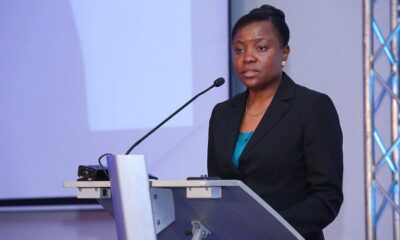

How Apopo’s tender wars earned Kenya Power a blacklist slot
-


Kenya’s First Oil Sale Remains A Big Secret
-


Report: Kenyans Optimistic That 2018 Will Be A Better Year, Majority Looking To Venture Into Businesses Than Being Employed
-
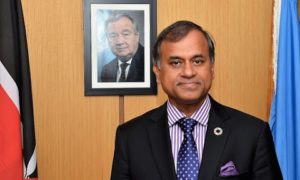

Siddharth Chatterjee: UN’s Man of Honour or Disgrace To Kenya
-
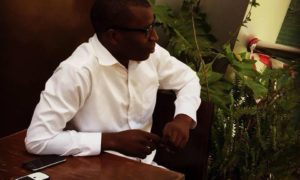

Blogger Cyprian Nyakundi’s ‘Boy Child’ Campaign Fundraiser Was Well Deserved But Was Miscalculated
-


World Bank Says Kenya’s Economic Growth For The Year, Slowest In Five Years, And What This Mean For The 2018 Entrepreneurs

Hackers Infiltrate Judiciary’s Digital System, Locking Out Staff and Disrupting Cases

Fuel Prices Soar As EPRA Announces Sharp Increases in July Review

French First Lady Brigitte Macron Appeals in Case Against Two Women Who Claim She Used To Be a Man

CMA Ordered to Pay Sh7.5 Million After Damaging Report Costs Investment Executive Prime Job

Youth Business Leader Charged in Sh38 Million Gold Fraud Scheme

Judiciary E-Filing Hit With Massive Malfunction Users Directed to Email

Ghislaine Maxwell Ready to Reveal ‘Truth’ About Epstein Client List

Will The World End on Aug 2? Prophet Owuor Responds To Viral Doomsday Report

The Day I Said Toka Nje and He Stood in a Towel Crying as I Took Back My Peace and Sanity

MUNDIA KAMAU: William Ruto Is Not The Only Unpopular President That Kenya Has Had

From Billionaire to Broke: The Fall of Humphrey Kariuki’s Empire

How NCBA Software Engineer Opened Floodgates For Mobile Banking System Fraud

Investigation Exposes Alleged Sex Crimes at Alliance Girls High School Amid Institutional Cover-Up

EXCLUSIVE: How Corruption and Mismanagement Have Brought Kenyatta National Hospital to Its Knees

Housing PS Charles Hinga Entangled in Sh 2B Tender Scam

Inside the Kibaki Estate Dispute: Power, Bloodlines & the Unfolding Legal Drama

Former PS Warns of Hidden Hand Behind Mwaura’s Sh1.6B HF Group Acquisition, Predicts Delisting

Police Officer Who Shot Mask Hawker During Protests Arrested

Court Ruling Leaves Agnes Kagure Exposed in Sh600M Land Fraud Targeting Foreigners

How Deep is DIG Lagat in The Kenyan Deep State?
Most Popular
-

 Investigations2 weeks ago
Investigations2 weeks agoInvestigation Exposes Alleged Sex Crimes at Alliance Girls High School Amid Institutional Cover-Up
-
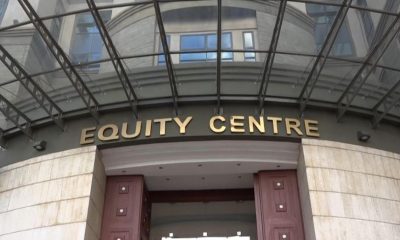
 Business22 hours ago
Business22 hours agoInside Equity Bank’s Sh1.5 Billion Heist: A Web of Deception and Cover-Up
-

 Business7 days ago
Business7 days agoCourt Freezes Kenya’s Afriswiss Commodities Bank Account in Alleged Gold Fraud
-
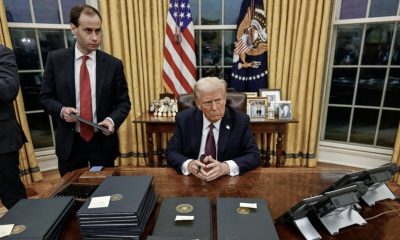
 Americas2 weeks ago
Americas2 weeks agoHow A Nigerian Yahoo Boy’s Elaborate Plan to Scam Trump Backfired As FBI Goes After Him
-

 News1 week ago
News1 week agoIrony of Lydia Mathia Seeking Court Interventions Months After Calling Court Orders ‘Mere Papers’ While Spearheading Evictions
-
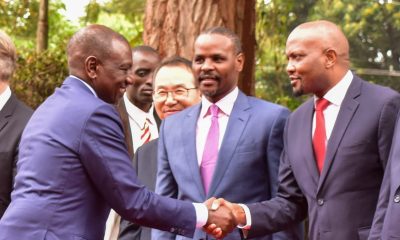
 Politics6 days ago
Politics6 days agoMoses Kuria Resigns from Kenya Kwanza Government
-

 News2 weeks ago
News2 weeks agoOutrage as Kenya Agrees to Buy Defence Equipment From UK in Ksh12.5 Billion Deal
-
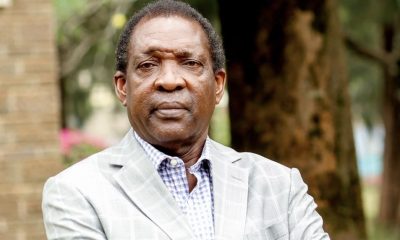
 Business1 week ago
Business1 week agoProf. Herman Manyora Appointed as The Nairobi Hospital Chair

